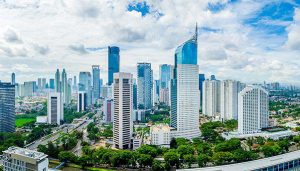 Not just one line, but an entire new system that will change the way the city works. Jakarta has joined the ranks of London, Paris and Riyadh in launching an ambitious project to build six new subway lines for a total of 230 kilometres (142 miles).
Not just one line, but an entire new system that will change the way the city works. Jakarta has joined the ranks of London, Paris and Riyadh in launching an ambitious project to build six new subway lines for a total of 230 kilometres (142 miles).
Like the Crossrail in London, the Grand Paris Express in Paris and the new Riyadh subway system, Jakarta’s plan will significantly change the city’s public transport map, reaching neighborhoods and areas that were previously cut off.
The Indonesian capital is the latest city to place its bets on sustainable mobility which — according to President Joko Widodo’s plan – will become the engine of growth for a country that aspires to compete in the region with China and Japan.
Jakarta’s subway: the new metro project
Jakarta’s subway network expansion is one of the most ambitious sustainable mobility projects in the world. To complete it, the Indonesian government is planning an investment of $40 billion, which will be financed partly with public funds and partly with the support of private investors. In addition to the line that was partially opened in 2019, the programme calls for construction of six new lines that will cross the city creating a transport network comparable to that of Hong Kong and Singapore.
«We have a target of building 230 kilometers by 2030, that’s the masterplan», Willam Sabandar, the MRT Jakarta president told Bloomberg in an interview. «We only have 16 kilometres (9.9 miles) right now, so the key is how we can do this in an accelerated way. We can no longer just build them one by one».
Indonesian development depends on infrastructure
The new Jakarta’s subway network is part of a broader and more ambitious plan launched by President Joko Widodo in 2019. The goal is to grow the Indonesian economy from a current GDP of $1 trillion to $7 trillion by 2045. According to the government, one of the engines of this growth will be infrastructure, both to modernize the country and to create jobs and wealth. The $40 billion planned for the Jakarta metro is only a fraction of the $412 billion that the government intends to invest in infrastructure in the next five years.
The to-do list includes building dams, roads, bridges, buildings. But first and foremost the focus is on municipal and regional railways, which are crucial to reducing pollution and congestion, and to facilitate the transport of people and goods.
At the top of the list is a 44-kilometre (27-mile) light metro that will cross the capital, followed by a railway network that will connect some of the most important airports in the country. The provinces of Sulawesi and Kalimantan will get a new train network.

But the government’s goal is also to support the construction sector, and open the market to new players besides the Japanese and Chinese firms which so far have dominated. To date, the first Jakarta metro line has been built by a Japanese group, and the first high-speed train that connects Jakarta to Bandung will be built by a Chinese group.
Gargantuan works for a growing country
Over $400 billion to spend by 2024: Indonesia’s plan is among the most ambitious in the world in terms of economic commitment and short-term results. The government intends to cover 40% of the overall cost; 25% will be financed by state-owned enterprises and the rest by the private sector. Around two thirds, or 60%, will be used to develop transport-related infrastructures. Therefore in addition to the subways and railways, Indonesia’s gargantuan spending plan calls for the construction of 25 new airports and numerous ports that will improve connections between the 17,000 islands of the archipelago, which cover an area the size of the distance between New York City and London.
Improving domestic connections between far-flung points in this large country is considered the best strategy to support its growth and development. And it was a key topic that helped President Widodo win re-election last year in a campaign strategy based on economic growth through investments. Last year, the country’s GDP grew by around an estimated 5%, while the government is targeting GDP growth of 5.6% in 2020 and 6% thanks to massive infrastructure investments. If Indonesia wants to keep its place among the leading Asian economies, it needs to win this bet.

